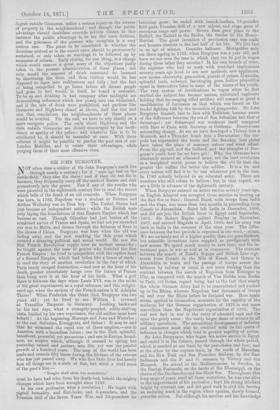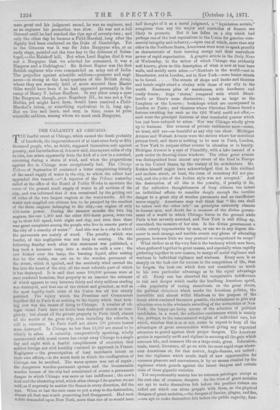SIR JOHN BURGOYNE.
NOT often does a soldier of Sir John Burgoyne's mark live through nearly a century ; for if " men age fast on the battle-field," they also die there ; and if they do not die in harness, they frequently carry off the seeds of disease and sink prematurely into the grave. Few if any of the youths who were gazetted in the eighteenth century live to read the record which tells of the death of an old comrade. When Burgoyne was born, in 1782, Napoleon was a student at Brienne and Arthur Wellesley was an Eton boy. The United States had just become an independent nation ; while the British were only laying the foundations of that Eastern Empire which has become so vast. Though Gibraltar had just beaten off the combined navies of France and Spain, we had not yet stretched our arm to Malta, and thence through the Isthmus of Suez to the shores of China. Burgoyne was born when the old was fading away and the new cracking the thin crust which covered a decaying political and social world. He saw the first French Revolution topple over an ancient monarchy ; he fought against the man of genius who founded the first French Empire ; he lived to sympathize with the captive head of a Second Empire, which had fallen like a house of cards ; to read the story of another revolution in the fury of which Paris barely escaped destruction,—and now at the hour of his death, greater uncertainty hangs over the future of France than hung over it at the hour of his birth. What a gulf there is between the days when Louis XVI. was in the midst of his great experiments as a royal reformer, and this enlight- ened age, when the saviour of the French nation is M. Adolphe Thiers ! When Frederick the Great died, Burgoyne was two years old ; yet he lived to see William I. crowned at Versailles Emperor in Germany. Looking backward in his last days, what a strangely-peopled, oddly-shifting vista, limited by his own experience, the old soldier must have beheld ! At the beginning, Marengo and Jena and Waterloo ; at the end, Solferino, lainiggriitz, and Sedan I It may be said that he witnessed the rapid rise of three empires,—one in America, with a boundless future ; one in the East, splendid, beneficent, powerful, yet precarious ; and one in Europe, brand- new, an empire which, although it seemed to spring but yesterday, armed and mature, into life, yet was the painful growth of a hundred years. The map of the world has been made and remade fifty times during the lifetime of the veteran who has just passed away. We who live little lives feel keenly how all things are in a state of flux, but what a vivid sense of the poet's line,—
" Nought shall abide but mutabilitio," must he have had who, from his death-bed, beheld the mighty changes which have been wrought since 1782.
In his own profession what a revolution 1 He began with pigtail formality, and flint-locks, and 6-pounders, and the Prussian drill of the Seven Years' War, and 24-pounders for battering guns ; he ended with breech-loaders, 16-pounder field guns, Prussian drill of a new school, and siege guns of enormous range and power. Brown Bess gave place to the Enfield, the Enfield to the Snider, the Snider to the Henry- Martini. The great invention of percussion caps was made and became obsolete in the last half of his life. We live fast in an age of science. Consider balloons. Montgo]fier only set them agoing in 1783, when Burgoyne was a year old, and have we not seen the uses to which they can be put in sieges during these latter fiery months ? In his own branch of arms, the engineer who had to work with wretched implements seventy years ago lived to see new methods, new appliances, new means, electricity, gun-cotton, picrate of potass, dynamite, splendid tools, railways, far-ranging guns, hollow projectiles equal in destructive force to some of the mines of his youth. The very system of fortifications in vogue when he first studied the subject has become useless, cultivated engineers holding that far-ranging rifled artillery will compel as great a modification of fortresses as that which was forced on the feudal fighting folk by the invention of gunpowder. Sir John Burgoyne himself, face to face with Todleben, became aware of the difference between the era of San Sebastian and that of Sebastopol ; yet Sebastopol was weakness itself compared with Metz or Paris, with Antwerp or Coblentz. Everywhere astounding change. At sea we have developed a Victory into a Monarch, and a Thunder bomb into a Devastation ; the tor- pedo has superseded the boom and the fire-ship, iron plates have taken the place of masonry ashore and wood afloat. From the pig-tail, and the halberd, and the triangles of Bur- goyne's youth how far we have got I Why, the Germans have absolutely secured an educated army, not the least revolution in a benighted world, prone to believe the old lie that the greater the ruffian the better the soldier. It is a lie, and every nation will find it to be one whenever put to the test. In 1782 nobody believed in an educated army. There are numbers who still refuse to believe ; but, in that regard, we are a little in advance of the eighteenth century. When Burgoyne entered on active service seventy years ago, an English Admiral was occupied three months in beating up. the Red Sea to Suez ; General Baird, with troops from India and the Cape, was more than two months in proceeding from Cosseir to Alexandria. Baird left India in December, 1800, and did not join the British force in Egypt until September, 1801. Sir Robert Napier quitted Bombay in November, 1867, and entered Magdala in April, 1868, and his army was back in India in the summer of the same year. The differ- ence between the two periods is expressed in one word,—steam. We are certainly not of a higher quality than our grandfathers, but scientific inventions have supplied us prodigiously with new means. We spend much money to save time, and the in- vestment pays, in war as well as in commerce. The contrast between the march of Baird's Sepoys and British Line regi- ments from Cosseir to the Nile at Keneh, and thence to Alexandria in boats, and the passage of troops across the Isthmus by railway or canal, is not more striking than the contrast between the march of Napoleon from Boulogne to Ulm, as compared with the march of Von Moltke from Berlin to Paris, via Sedan, regard being had to the fact that nearly the whole German Army had to be concentrated and pushed up to the Rhine, whereas Napoleon had thousands of troops on and over the Rhine before he declared war. Here again steam, applied to locomotion, accounts for the rapidity of the moderns, for the German organization of 1870 is not more marvellous than the Napoleonic organization of 1805. The real new fact in war is the entry of educated rank and file upon the grisly scene ; the vastly larger share of science in all military operations. The astonishing development of industry and commerce must also be credited with its fair quota of influence in changes which tend to greater rapidity of action. Sir John Burgyoyne, who began his active service in Egypt and ended it in the Crimea, passed through the whole period, which is marked at one limit by the post-chaise and four, and at the other by the express train, by the roads of Macadam and the New York and San Francisco Railway, by the East Indianian and the P. and 0. steamer, by Victory and the Monarch. He served in the Mediterranean, in Sweden, in the Iberian Peninsula, on the banks of the Mississippi, on the shores of the Dardanelles and the Black Sea. Throughout this long range of years, amid all these mutations, he was ever alive to the improvement of his profession ; kept his strong intellect bright by constant use, and did good work in civil life, leaving an enduring mark in the region where opinion, slowly formed, precedes action. But although his services and his knowledge were great and his judgment sound, he was an engineer, and as an engineer his promotion was slow. He was not a full General until he had reached the ripe age of seventy-two ; and only the other day he became a Field-Marshal, long after the dignity had been conferred on the Duke of Cambridge. Yet in the Crimean war it was Sir John Burgoyne who, at an early stage, pointed out the true key to the defences of Sebas- topol,—the Malakoff hill. But when Lord Raglan died it was not a Burgoyne that we selected for command, it was a Simpson and a Codrington I Sir Robert Napier was the first British engineer who ever commanded an army out of India. The prejudice against scientific soldiers—gunners and engi- neers—is strong at the head-quarters of the British Army, where they are scarcely held of more account than Master Giles would have been if ho had appeared personally in the camp of Henry V. before Harileur. In any other army a man like Burgoyne, though, pace Napoleon III., he was not a Von Moltke, yet might have been, would have received a Field- Marshal's Wawa, or something equivalent to it, long ago. But we live and learn, and may, in time, come to prize scientific soldiers, among whom we must rank Burgoyne,



































 Previous page
Previous page